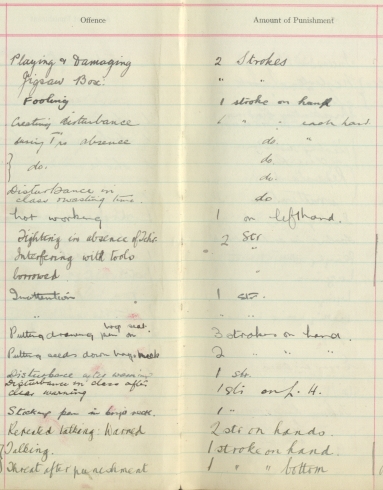Truanting; fighting; punching; disobedience; smoking in school; careless written work; being an annoyance; swearing at a teacher; writing swearwords on a wall. These were all offences recorded as reasons for the use of corporal punishment in Tinkers Farm School punishment book [S 200/2].
Corporal punishment was outlawed in UK government funded schools in 1987. The school logbooks from the 1890’s provide ample examples of its use in daily school life. The careless written work had demanded one stroke on the right hand, presumably the offending hand, whereas swearing was punished by two on each. In 1892 Floodgate Street School was unusual in obtaining permission to inflict corporal punishment on girls, but it was still mostly boys who were recorded as receiving punishment.
The language used to describe corporal punishment at Floodgate Street School is notable, with the headmaster being “compelled to cane several boys for truanting and lying” [S68/2/1 15.5.95], and writing that he “Had to cane persistent late comers” [S68/2/1 25.11.92]. It implies that the headmaster had no choice other than to physically punish those misbehaving.
Punishment at school could become controversial if the child was seriously hurt, and would occasionally cause problems for the teachers inflicting it if parents become involved:
“Had four complaints from parents about teachers inflicting corporal punishment. Called the staff together + called their attention to board regulations.” [S68/2/1 14.3.92]
There are numerous examples of punishments being claimed as excessive and often the head teacher investigated these. Sometimes these complaints had to be referred to the School Board for jurisdiction. On one occasion at Floodgate Street School this involvement became complex and the head teacher’s decisions challenged. These entries will be posted next.
To see the related tweets click here.

